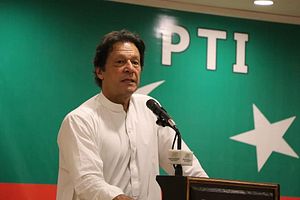The next government in Pakistan, saddled with mounting debts and a severe foreign currency shortage, is facing a dilemma over whom to turn to for critical financial assistance. Both the main options could undermine some of Prime Minister-elect Imran Khan’s social and economic goals.
One funding option for Khan, whose Pakistan Tehreek-e-Insaf party (PTI) won the most seats in elections last month, is to look to the IMF. But under pressure from Islamabad’s former ally, the United States, the Fund might impose tough conditions, limiting Khan’s plans for an Islamic welfare state and the capacity to repay Chinese loans supporting the $62 billion China-Pakistan Economic Corridor (CPEC). A second option, an approach to China, may reduce Khan’s leverage in seeking greater transparency over CPEC projects.
CPEC is the flagship of China’s Belt and Road Initiative (BRI), a $900 billion investment in roads, railways, ports, energy plants, and special economic zones across Asia, Africa, and the Middle East. About 20 CPEC projects, worth some $19 billion, are completed or under way, with the rest due to be finished by 2030, according to the Wall Street Journal.
Pakistan has welcomed Chinese investment, seen as crucial to spurring development and growth. But Pakistanis, like other recipients of BRI loans, have become wary of the largely opaque terms of projects, which are believed to be putting the country’s finances under severe strain. The NGO Center for Global Development warned in March that Pakistan’s economic problems were compounded by the infrastructure developments. It said big-ticket BRI projects and the relatively high interest rates being charged by China add to Pakistan’s risk of debt distress.
Burdened by a widening trade deficit — nearly $40 billion in the last financial year — with just enough foreign currency to pay for two months’ of imports — of which materials and equipment for CPEC projects represent a significant proportion — Pakistan must decide whom to ask for a bailout. Currency devaluations and new import duties have sought to arrest the balance of payments crisis but to no avail. The sums required to avert a financial crisis are substantial. The incoming finance minister, Asad Umar, puts the figure needed at around $12 billion. That means, realistically, that Islamabad can either return to the IMF or further inflate its Chinese debt, with both options likely to represent serious drawbacks for the Khan premiership.
Pakistan has turned to the IMF 12 times since the late 1980s. Should it do so again, its strict loan terms may be even tougher. That is because Washington, which fell out with Islamabad over its perceived failure to tackle Islamic extremism, appears to be pressing the IMF to ensure that any loans are not used repay the Chinese. Trump administration officials argue that China’s BRI loans to developing counties lead to unsustainable levels of debt.
Additionally, Islamabad worries that the Fund may want Pakistan to make full disclosure of the terms of CPEC projects — which Beijing might oppose. Since conditions for the infrastructure and energy deals are largely opaque, there have been concerns that Pakistan, in its haste to secure projects, is giving too much ground to China. In one of the biggest CPEC deals, this appears to have been borne out. Pakistani officials have revealed that just over 90 percent of revenues generated by the Gwadar port development will go to China over the course of its 40-year operational agreement.
Notwithstanding Washington’s reservations about an IMF bailout, should one go ahead, it will put a damper on one of Khan’s main election commitments – an Islamic welfare state – as the Fund will likely insist on cuts to public expenditure among its conditions. For Khan, who has long campaigned for an end to the inequalities in Pakistan, having to seriously scrimp on his plans for social spending would be a blow.
Since his election victory, Khan has praised Pakistan’s relations with China along with CPEC, with Beijing returning the compliment in the form of a reported $2 billion loan to help address its ally’s foreign currency problems. Yet Khan’s party has been critical about aspects of the Chinese-backed scheme: in opposition, the PTI questioned the value of some projects. Umar, the future finance minister, said on August 8 that CPEC agreements would be brought before parliament to ensure transparency. Commentators have speculated that the new authorities might also try to review the terms of certain deals and demand more economic benefits for the poor.
The trouble is that Khan’s negotiating position will not be very strong if he is simultaneously attempting to secure new Chinese financing to address the country’s economic woes. Beijing remains sensitive about transparency and is probably still smarting from Pakistan’s withdrawal of its request last November to include the $14 billion Diamer-Bhasha dam in CPEC because the terms, a senior Pakistani official said, were “against our interests.” The premier-in-waiting may also face resistance from the military, which backed his candidacy. The generals are big supporters of CPEC and would not want to risk upsetting China.
The soon-to-be installed Khan government is expected to make a decision on where new funds will come from in the next few weeks. A possible $4 billion Saudi loan may provide some breathing space. But, given the sums required, it seems Khan will ultimately have to turn to China or the IMF. That will be a tough call for the new premier, as both throw up significant risks to his administration. Khan has long sought to lead his country, but would probably have hoped for a less stressful baptism.
Yigal Chazan is an Associate at Alaco, a London-based business intelligence consultancy.

































